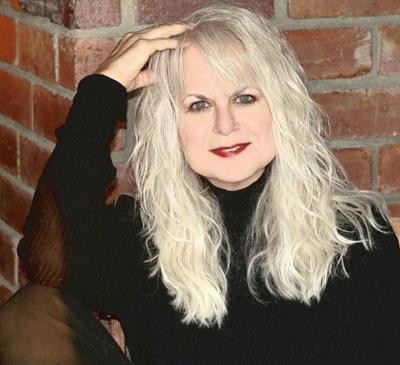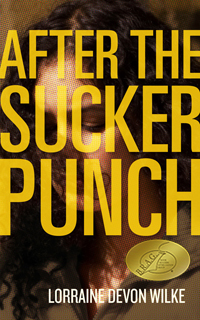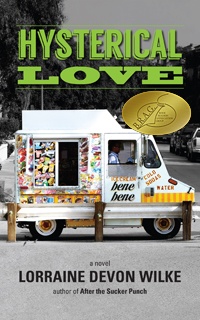 Lorraine Devon Wilke
Lorraine Devon Wilke
I was gathered with a group of writers recently—some with impressive resumes, others with little or no experience—when a conversation was sparked by one of the women in attendance:
“I want to be a writer but I can’t think of anything to write about. I keep trying, month after month; I’ll get an idea, and sometimes I even start it, but after a while I fizzle out, bored and disinterested. I don’t know what to do. I really want to publish a book, but how do you know what to write about?”


While the rest of the group jumped in with every kind of mental exercise, writing routine, inspirational drill, etc., in hopes of helping her jumpstart her process, I got a little twitchy and went a whole other way:
“Maybe writing’s not your thing.”
The conversation stopped as if I’d spoken another language. I continued:
“I’m being the Devil’s Advocate, clearly, but if after all this time of trying you aren’t inspired and can’t find anything to write about, isn’t it possible this just isn’t your path? Maybe your Muse is better served in another art form, another discipline, say… music. Art. Something that actually compels you to create rather than makes you feel obligated and frustrated.”
There was a pause; she cocked her head as if contemplating my theory, then blurted out:
“But everyone’s publishing a book and I want to too!”
With that, the group pushed past my comment to continue their instructional chatter.
I pondered my point…yep, it had merit, so I’ll say it again:
If you aren’t absolutely compelled to write, literally driven to write, then you might want to rethink your rationale for writing. Just being able to publish is not a good enough reason… nor, frankly, does it offer much inspiration.
And that’s the first step to your holistic writing career: DEFINING YOUR MISSION AS A WRITER. It’s no small thing. It means being brutally honest and bracingly pragmatic about your reasons for putting pen to paper, fingers to keys. Have you ever really thought about it? Do you know why you write? Can you articulate it? I can. Just ask me and I’ll wax eloquent!
Until then, here are a few of the more common reasons:
- 1. I must write. I have stories, ideas, plots, and characters that won’t stay inside my head; I have to write them down or I won’t sleep at night.
- 2. I’ve discovered I have a real talent for writing… and just doing it absolutely exhilarates me.
- 3. I’ve always been a passionate reader, and since reading has been so important to me, I want to write books that affect others the way books have affected me.
- 4. Writing is an incredible art form for which I have so much respect; I want to learn to do it well, contributing the best possible version of my own voice to the artistic conversation.
- 5. I can’t not write.
- 6. It’s a snap now to self-publish on Amazon and Smashwords, so why not?
- 7. I really want the status of saying “I’m a writer.” There’s something so cool about that!
- 8. All my friends are self-publishing; I want to be part of that trend.
- 9. I’ve heard if you put out enough books in a year, even if you’re only charging a dollar, you can really rake it in. I’ve got to make money somehow, so why not this?
- 10. You don’t have to be the greatest writer in the world to be successful; readers these days are pretty forgiving, especially if your books are cheap.
I probably don’t have to point this out, but unless your reasons stopped at #5, you might want to reconsider your ambitions.
Beyond a prerequisite respect for learning the art and craft of writing; beyond your integrity in terms of quality standards, let’s be honest: writing, as a career, is not an easy road. Nor is it, no matter what anyone tells you, a slam-dunk in terms of making money. Considering the hundreds of thousands of writers who jump in every year, relatively few actually make any appreciable income (with plenty of statistics to prove that out).
Then there’s the cost. It’s a fact that to professionally produce a book, as well as launch and maintain an effective marketing and promotional campaign, you’ve got to spend some considerable bank. Many book sites and “experts” in the field may try to convince you otherwise, but I’m here to tell you: you can’t do it right unless you put some money into it:
For professional editing, formatting, cover design, and website construction; set-up costs on a wide range of book sites; payment for various sale promotions (i.e. BookBub, ereaderNews, BooksGoSocial, etc.). There’s the cost of on-site readings (banners, books, snacks, fees); cost to put books in stores (many charge self-published writers for that privilege); printing out paperbacks for reviewers and editorial writers; the cost of contest submissions…. I could go on, but suffice it to say: money is required.
Then there’s the landscape and status of the marketplace. The ease of publishing has made it easier for anyone who wants to publish a book to do so, but it’s also left the marketplace flooded with product. Forbes Magazine cited this statistic:
“There are somewhere between 600,000 and 1,000,000 books published every year in the US alone, depending on which stats you believe.”
That’s a LOT of books. Which means the chance of your book standing out, being discovered, getting found, etc., becomes exponentially more difficult. Which has caused many authors to get more frantic about how they try to pull themselves out of the pack. The sheer volume of book posts on social media has not only had the effect of inuring (and annoying) readers to the message, it’s even having an effect on the platforms themselves. Derek Haines of Just Publishing Advice Advice writes:
“My Twitter accounts that are directed more at readers have plummeted from around 120 new followers per day a year ago, to struggling to attract 20 to 40 now.
“What this means is that new self-published authors are still clearly flocking to Twitter to talk to each other, but general interest users and potential readers are not. While this can be blamed directly on Twitter failing to attract new active users, it could also be a signal that the supply side of the ebook market is now outweighing demand.” [Emphasis added.]
Which means the ease and impact of using free social media to promote your books is becoming less effective. Which means you’ve got to get creative and have enough in your budget to not only experiment with new marketing strategies, but sustain them.
Put all those elements together – learning the craft, dealing with production and publishing demands, and affording effective marketing and promotion – and what you’ve got is either an expensive hobby or a very challenging career. Either way, you need to be very clear of what your mission is before you make the leap.
Interesting story: a few months ago I wrote a piece rebutting an expert’s instruction to crank out 4+ books a year as the “#1 way to get discovered.” Given my prodigious experience as a reader, as well as the various conversations I’d had with stressed-out writers beleaguered by such ridiculous mandates, my piece was aptly, if clickbaitedly, titled, “Dear Self-Published Author: Do NOT Write Four Books a Year.” My thesis? Most writers will find cranking out four excellent books a year to be a nearly impossible task… emphasis on the word “excellent.”
What I got in response, from legions of deeply annoyed indie writers, was pushback more hostile than anything I’d received on any subject I’d covered prior, be it guns, politics or porn. Why? Clearly I’d struck a nerve with the thousands of self-published writers who are pumping out 4+ books a year, and are either convinced that their quality standards are intact regardless, or, if quality has been sacrificed, it was justified by the ensuing income they were earning. To which I say: hmmmmm.
But wherever you stand on that debate, decide your mission. If you enjoy writing quick, easy fare and have no problem delivering it with enough speed and volume to reach that 4+-a-year mark and make a living, even at a dollar a book, go for it. If you’re more interested in creating gorgeous prose, writing quality fiction that may take a year, two years, even more, to accomplish, do that. If there’s some other way in which you choose to identify as a writer, that’s fine, too. Just be very clear about what it is and don’t let anyone browbeat you out of it, whichever way you go.
And once you’ve decided, then it’s time to design your career: choose what genre of books you’ll write, how often you’ll produce them; what kind of marketing campaigns will reach the audiences you want to reach. Decide the kind of website you want, your social media presence, the book sites and blogs you’ll promote to; the promotions and sales that will fit your strategy.
Mostly, be honest, smart, and savvy about every element of what it takes to be the writer you choose to be. Be realistic about your goals, your chances; be prepared for the feedback you’ll get, and make a pact with yourself to always be a gracious, professional, and considerate member of the writing community.
And once you’ve got all that sorted out, go have a blast writing your books!
Lorraine Devon Wilke:
Author, photographer, and singer/songwriter, Lorraine Devon Wilke, brings the sum total of her creative experience to her compelling contemporary fiction. Pulling from every chapter of her eclectic background, she creates characters and plots that are both unique and recognizable, with dialogue that jumps off the page; her book covers are designed with her photography, and her debut novel, AFTER THE SUCKER PUNCH, even includes a free download of one of her songs.
A longtime contributor to The Huffington Post, Devon Wilke’s trademark “sass and sensibility” infuses her work with candor, provocative themes, and, whenever possible, lots of laughter. But whether exploring issues of family, faith, love, or heartbreak, her stories always embrace an elemental mix of heart and soul. Along with AFTER THE SUCKER PUNCH, her second novel, HYSTERICAL LOVE, is also an indieBRAG Medallion Honoree.
Follow her adventures in publishing at www.AfterTheSuckerPunch.com, with all other links and information available at www.lorrainedevonwilke.com.
Contact: info@lorrainedevonwilke.com.
Thanks for serving it up without the sugar-coating, Lorraine. I even think the word “define” might have a little to much pressure in it, to go in the wrong direction and make a head decision, rather than a heart decision — the head comes later but knowing you must write is something intangible.
I get your nuance, Virginia, and thank you for weighing in. Overall I agree with you:
Having the impulse to write (the “heart decision,” as you put it) is certainly an essential “inciting incident” to being a writer. But every artist who has that impulse also has to take the next step of defining what they want to DO with that impulse. In truth, I think “knowing you must write” is already a form of definition, certainly different than just saying you want to “publish a book” but are not inspired enough to know what to write about or how!
But I’ve learned that some people never get past the impulse… or the discussion of the impulse. So while it’s necessary to have the feeling, to actually become a writer, one has to get beyond heart to think and imagine and formulate and… actually write! 🙂